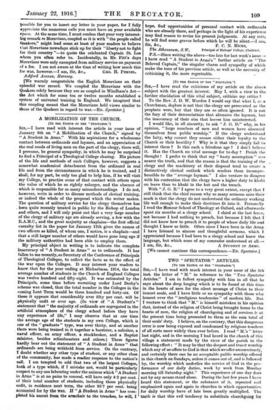A MOBILIZATION OF THE CHURCH.
[TO THE EDITOR OF THE " SEECTATOR.1
S111,—I have read with interest the article in your issue of January 8th on " A Mobilization of the Church," signed by " A Student in Arms." With his aspirations for a wholesome contact between ordinands and laymen, and an appreciation of the real needs of living men on the part of the clergy, there will, I presume, be general sympathy, in which he may be surprised to find a Principal of a Theological College sharing. His picture of the life and methods of such Colleges, however, suggests a somewhat academical detachment from the ordinand in real life and from the circumstances in which he is trained, and I shall, for my part, be only too glad to help him, if he will visit my College, to practise some of that contact with others upon the value of which he so rightly enlarges, and the absence of which is responsible for so many misunderstandings. I do not, however, write in order to discuss methods of clerical training, or indeed the whole of the proposal which the writer makes. The question of military service for the clergy themselves has , been quite recently treated in public by the Bishop of London and others, and I will only point out that a very large number of the clergy of military age are already serving, a few with the R.A.M.C., and the great majority as chaplains—the first official casualty list in the paper for January 12th gives the names of two officers as killed, of whom one, I notice, is a chaplain—and that a still larger number of others would have gone long ago if the military authorities had been able to employ them.
My principal object in writing is to indicate the complete inaccuracy of " A Student in Arms " as to ordinands. It has fallen to me recently, as Secretary of the Conference of Principals of Theological Colleges, to collect the facts as to the effect of the war upon the Colleges. It may interest your readers to know that for the year ending at Michaelmas, 1914, the total average number of students in the Church of England Colleges was twelve hundred and fifty-eight. It was estimated by the Principals, some time before recruiting under Lord Derby's scheme was closed, that the total number in the Colleges in the coming Lent Term would be three hundred and forty-six. Of these it appears that considerably over fifty per cent. will be physically unfit or over age. (In view of " A Student's " statement that " the majority of ordinands are segregated in the artificial atmosphere of the clergy school before they have any experience of life," I may observe that at one time the average age of the students in my own College, which is one of the " graduate " type, was over thirty, and at another there were being trained in it together a barrister, a solicitor, a naval officer, an army officer, a stockbroker, and a Baptist minister, besides schoolmasters and others.) These figures hardly bear out the statement of " A Student in Arms " that ordinands are being withheld from service. On the contrary, I doubt whether any other type of student, or any other class of the community, has made a readier response to the nation's (All. I am tempted to add that two of the largest Colleges, both of a type which, if I mistake not, would be particularly suspect to any one labouring under the animus which "A Student in Arms " is at no pains to conceal, will have only 4.3 per cent.
of their total number of students, including those physically unfit, in residence next term, the other 95.7 per cent. being accounted for by the war, If "A Student in Arms " has com- pleted his ascent from the armchair to the trenches, he will, I
hope, find opportunities of personal contact with ordinandi who are already there, and perhaps in the light of his experience may find reason to revise his present judgments. At any rate, ho will find some graves before which ho will be silent.—I am, The Athenaeum, S.W. Principal of Bishops' College, Cheshnnt.
P.S.—Since writing the above—too late for last week's issue — I have read " A Student in Arms's " further article on " The Beloved Captain," the singular charm and sympathy of which make the tone of his previous article, as well as the necessity of criticizing it, the more regrettable.


































 Previous page
Previous page